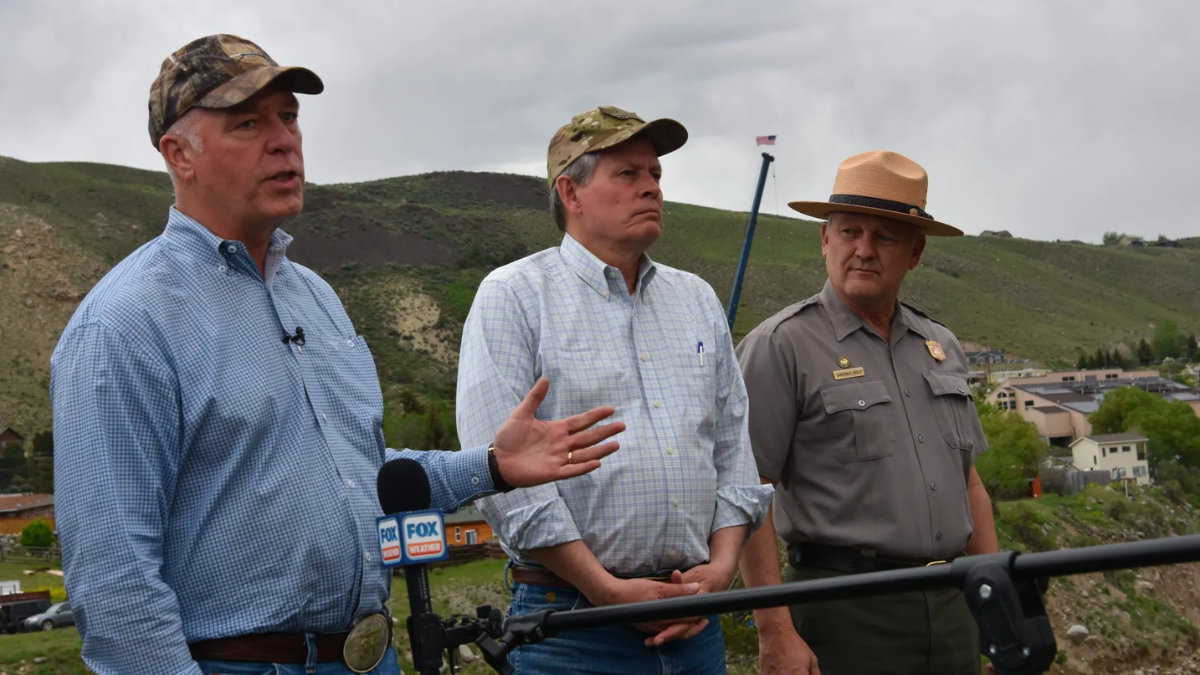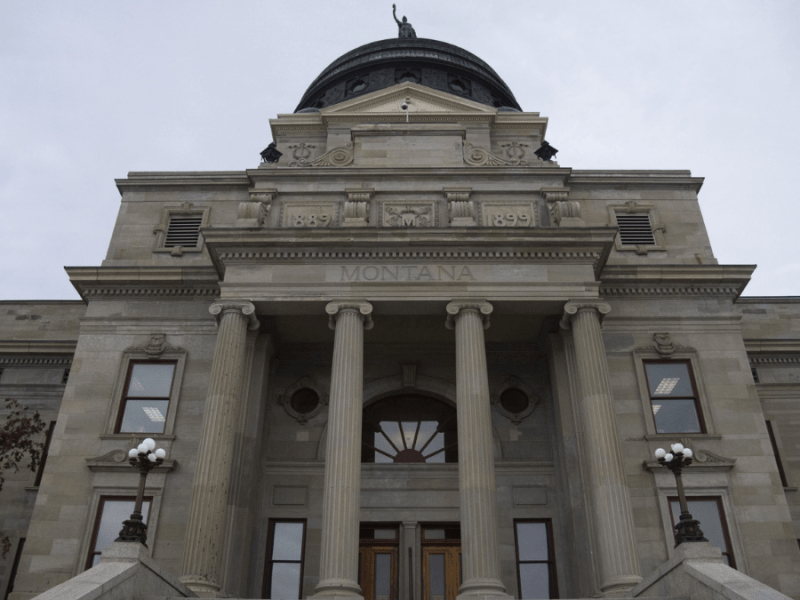Montana Gov. Greg Gianforte has signed into law a bill that bars the state from considering climate impacts in its analysis of large projects such as coal mines and power plants.
House Bill 971 was among the most controversial energy- and environment-related proposals before the Legislature this session, drawing more than 1,000 comments, 95% of which expressed opposition to the measure. HB 971 bars state regulators like the Montana Department of Environmental Quality from including analyses of greenhouse gas emissions and climate impacts, both within and outside Montana’s borders, when conducting comprehensive reviews of large projects. It builds off of a decade-old law barring the state from including “actual or potential impacts that are regional, national, or global in nature” in environmental reviews.
RELATED
Bill banning greenhouse gas analysis from permitting decisions heads to governor
Lawmakers suspended their rules to allow for House Bill 971’s introduction and passed the measure along party lines. Republican lawmakers supported the bill, saying it will help unwind a recent court decision over a gas plant under construction. Democrats said it will weaken Montanans’ right to participate in government decisions.
How the 68th Legislature shaped Montana’s energy policy
As the dust settles on the 2023 Legislature, Montana Free Press takes a look at the proposals likely to shape the state’s energy future for decades to come. Prominent themes include local control, the regulation of greenhouse gas emissions, and lawmakers’ frustration with the judicial branch.
Does Greg Gianforte have a plan for climate change?
As Montana’s top executive, Gianforte has the ability to influence energy policy and set statewide targets for emissions that experts say are significant contributors to the drought, heat waves and wildfires ravaging the West this summer. The actions he takes or doesn’t take during his time in office will help define the state’s role in addressing…
Gianforte signed HB 971 into law May 10 over opposition from climate and environmental groups that had argued that the measure hinders the state’s ability to respond to the crisis of our time: the atmosphere-warming emissions of greenhouse gases that are shrinking the state’s snowpack, reducing summer and fall streamflows, and contributing to catastrophic flooding and longer, more intense wildfire seasons. Opponents had also argued that the majority of Montanans believe in human-caused climate change and want meaningful climate action.
Results from a 2022 “Conservation in the West” poll of 416 registered voters in Montana bear this out. Three-fifths of those polled said there is enough evidence of climate change to support action and called for a transition to renewable energy.
Anne Hedges with the Montana Environmental Information Center said the Legislature is “hiding its head in the sand” by passing bills like HB 971, and she anticipates it will be the subject of a constitutional lawsuit.
“Climate change is real, it matters, the climate is part of our environment, and we cannot ignore the changes that are occurring. Ignoring it doesn’t make it better. It will only make things worse and make it more difficult and expensive to deal with later.”
Anne Hedges, Montana Environmental Information Center’s director of policy and legislative affairs
“Climate change is real, it matters, the climate is part of our environment, and we cannot ignore the changes that are occurring,” Hedges said. “Ignoring it doesn’t make it better. It will only make things worse and make it more difficult and expensive to deal with later.”
“Our families are already suffering from an increase in the number of sweltering summer days, longer wildfire and smoke seasons, and historic drought,” Winona Bateman, executive director of Families for a Livable Climate, wrote in an email to Montana Free Press. “I am not sure how Gov. Gianforte imagines we will do our part to address these growing impacts, or pay for them, if we’re not working to eliminate the root cause. Why would we wait for federal regulations to be part of the solution?”
Proponents of the measure, including its sponsor, Rep. Josh Kassmier, R-Fort Benton, argued that by pushing back on a recent ruling revoking a NorthWestern Energy gas plant permit, HB 971 underscores that it’s lawmakers, not judges, who set policy. Other proponents, including the Treasure State Resources Association and the Montana Petroleum Association, asserted that HB 971 protects state agencies from an “unworkable” mandate to measure greenhouse gas emissions and that any such regulation properly belongs under federal regulatory frameworks such as the Clean Air Act.
Gianforte spokesperson Kaitlin Price echoed this assessment in a statement to Montana Free Press.
“House Bill 971 re-established the longstanding, bipartisan policy that analysis conducted pursuant to the Montana Environmental Policy Act does not include analysis of greenhouse gas emissions,” Price said. “The bill would allow evaluation of GHGs if it is required under federal law or if Congress amends the Clean Air Act to include carbon dioxide as a regulated pollutant.”
During a committee hearing on the bill last month, Sen. Jen Gross, D-Billings, asked Kassmier if he believes humans cause climate change.
“House Bill 971 re-established the longstanding, bipartisan policy that analysis conducted pursuant to the Montana Environmental Policy Act does not include analysis of greenhouse gas emissions.”
Gov. Greg Gianforte spokesperson Kaitlin Price
“I’m not a scientist, so I’m not going to answer that,” he replied.
For his part, Gianforte told Montana Free Press in a 2021 interview that he does believe in human-caused climate change. He said “American ingenuity” can help mitigate it and argued for the government to remove friction in the marketplace..
The bill also comes as a Helena judge is weighing a case brought by 16 youth plaintiffs asking the judicial branch to require the state to measure and regulate greenhouse gas emissions. That lawsuit, Held vs. Montana, is set for a 10-day hearing that will start June 12.
It also comes as the U.S. Environmental Protection Agency considers a rule that would expand regulations dealing with power plants’ emissions of greenhouse gasses. If passed, the rule would require power plants like the coal-fired plant in Colstrip to capture 90% of its carbon emissions by 2038.
latest stories
Who the heck is on your ballot?
PLUS: Next steps for south-central Montana’s passenger rail push.
The race to be the partisan clerk of Montana’s nonpartisan Supreme Court
The clerk of the Montana Supreme Court is a unique position. Unlike the actual justiceships on the high court, the clerkship is partisan. And unlike almost every other state supreme court clerk in the country, Montana’s is elected.
Second Montana ski resort looks to turn wastewater into powder
More than a dozen ski areas in eight states, plus some in Canada, Switzerland and Australia, use wastewater to make powder. This past winter, the Yellowstone Club near Big Sky became the first in Montana to turn what was once sewage into snow.




